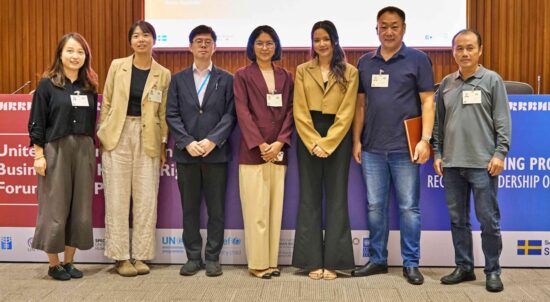Key takeaways from a joint session at the 7th UN Responsible Business and Human Rights Forum, Asia-Pacific in Bangkok

On 19 September 2025, Accountability Counsel, UN Global Compact Network Thailand (GCNT), and Give to Nature co-organized a panel discussion titled “Bridging the Connection between Businesses and Local Communities: Translating Sustainability into Actions in Southeast Asia,” as part of the 7th United Nations Responsible Business and Human Rights Forum, Asia-Pacific, at the United Nations Conference Center in Bangkok, Thailand.
The session was held with the aim to provide a constructive platform for stakeholders to exchange expertise and insights on mitigating risks and overcoming implementation barriers related to environmental and human rights safeguards and to highlight good business practices that demonstrate how meaningful stakeholder engagement and effective Grievance Redress and Accountability Mechanisms (GRAMs) can strengthen human rights due diligence and sustainability practices.
Collectively, the panelists agreed that businesses can create a positive impact for communities, but businesses must work to build trust and provide transparency for all stakeholders including local communities. Moreover, businesses should set up grievance mechanisms which can reduce risks, provide early warnings, and offer problem-solving solutions while engaging stakeholders. Another solution discussed was the neutral third party mechanism whereby an independent committee or mediator is involved in cases where direct dialogue becomes difficult, as the independent committee can make assessments in regards to human rights standards.
Key takeaways from the discussion include:
- Trust is the most critical element, repeatedly emphasized by all sectors.
- Businesses must engage communities directly, respectfully, and inclusively. It is important to find mutual benefits. Businesses should understand local needs and contexts, while communities should appreciate the value of cooperation.
- The key challenges to bridging businesses and communities are a lack of trust, information and power imbalances, structural and procedural barriers and emotional and logistical hurdles.
- Currently, the tools and strategies for improvement include effective Grievance Mechanisms, the participation of neutral third parties, proactive business practices, and a focus on mutual benefits.
A full summary of the discussion can be downloaded here.

